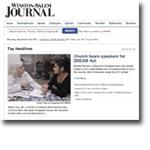Congregations Hear from Young Immigrants, Media Outlets Take Note
 Across North Carolina, congregations are participating in this year’s groundbreaking national event called the DREAM Sabbath 2011. Sponsored by the Interfaith Immigration Coalition, the DREAM Sabbath is a month-long opportunity to integrate stories of DREAM students into prayers, readings, reflections, or study sessions as a way to help educate and spread awareness of DREAM students and their hopes to attain full recognition of their contributions to our communities. Over 300 congregations nationwide are participating.
Across North Carolina, congregations are participating in this year’s groundbreaking national event called the DREAM Sabbath 2011. Sponsored by the Interfaith Immigration Coalition, the DREAM Sabbath is a month-long opportunity to integrate stories of DREAM students into prayers, readings, reflections, or study sessions as a way to help educate and spread awareness of DREAM students and their hopes to attain full recognition of their contributions to our communities. Over 300 congregations nationwide are participating.
Last week the Associated Press noted that ten NC congregations were hosting events, saying that “A campaign to change U.S. immigration laws to help young immigrants earn an education is taking to the pulpit in North Carolina churches.”
Over the weekend the Winston-Salem Journal featured two stories about local congregations who are getting involved. Moises Serrano is one undocumented young person who spoke with a congregation on Sunday:
Standing in front of the congregation at Gallaway Memorial Episcopal Church, Serrano said his parents had no food for him when he was an infant in Mexico, and that’s why they made a treacherous journey on foot, walking across a desert for three weeks to make the crossing when Serrano was about 18 months old, he said…
“My best friend was going to go off to college to be somebody, and I was going to stay here and be nobody,” he said.
“We are not criminals,” Serrano continued. “All we want to do is get an education and give back. … I want to own a house. I want to settle down.”
The NC Council of Churches supports this effort and we encourage more local congregations to participate in this year’s DREAM Sabbath. Click here for more information and to download a full packet of resources.
About the DREAM Act
The DREAM Act is a bill that is designed to give undocumented students the opportunity to earn legal status if they came to the United States as children, are long-term residents, have good moral character, and complete two years of college or military service in good standing. The bill was first introduced to legislation on Aug.1, 2001 and was reintroduced to the Senate on May 1, 2011. So far it has not managed to gain enough traction to become law.
Last fall, as the bill prepared to come to a vote in Congress, bishops and other judicatory heads from NC enthusiastically called on our elected officials to pass it into law. You can read their statement here.

